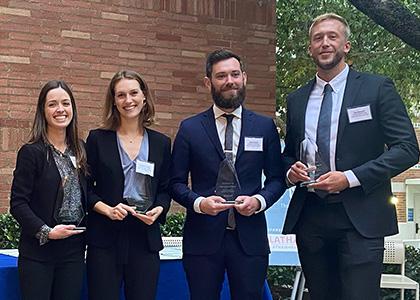UCLA Law Moot Court Flourishes Despite Challenges of Remote Advocacy

In what was a challenging few years for oral advocacy, with the infamous cat filter lawyer and the Supreme Court’s mysterious toilet flush, the UCLA Law moot court team didn’t just survive, it thrived.
The members of this year’s Moot Court Honors Board – the student group that manages UCLA’s moot court program – began law school in 2019. Many of them competed their first year in the Skye Donald Memorial Moot Court Competition, UCLA Law’s internal moot court competition open exclusively to 1Ls, before the pandemic. This spring, after two years of remote competitions, the moot court year at UCLA culminated in the Roscoe Pound Moot Court Competition back in person this spring.
In the meantime, the team has smoothly run the school’s four annual intramural competitions and UCLA Law’s 10th Annual Cybersecurity Moot Court Competition, as well as accumulating accolades in external competitions around the country.
Third-year students and Honors Board members Ariana Bustos and John Cagan recently won the 2022 Uvaldo Herrera National Moot Court Competition sponsored by the Hispanic National Bar Association. Bustos received the competition’s best oral advocate award.
At the Duberstein Bankruptcy Moot Court Competition hosted by St. John’s University School of Law, Kaitlyn Hittelman, Rachel Berman, and Matt Snyder took home second place out of 56 teams and were awarded for one of the top four best briefs. Isabelle Geczy and Kimaya Abreu advanced to the semi-finals of the Giles Sutherland Intellectual Property Moot Court Competition sponsored by American Intellectual Property Law Association.
Students run the show
The moot court program’s accomplishments are even more remarkable because the program is almost entirely student-run.
“You’re an entrepreneur,” says Cagan of the juggling act of running a moot court competition. In addition to writing the problem – a “perfect storm” of Fourth Amendment gray areas – for one of this year’s two upperclass competitions, he and the other board members dealt with seating, meals, fundraising, and all other aspects of the competition.
“It’s not a skill set they normally teach in law school,” notes Professor David Babbe ‘81, the moot court faculty advisor.
Acknowledging similarities between the practice of law and the hectic process of organizing a moot court competition, Honors Board member Andrew Hill remarks, “No matter how much you plan for everything, you can’t really plan for everything.”
Even with the challenges, this year’s Honors Board left its unique mark on the program.
The Roscoe Pound Competition—in which the winners from the two internal upperclass competitions compete—featured an honors reception. It was a first for the 71-year-old competition, which this year concluded with Samantha Lonergan ’23 being named the winner after a highly competitive final round.
The Board also secured an all-star panel of guest judges, which included Judge John B. Owens and Judge Kim McLane Wardlaw '79, both United States Circuit Judges of the United States Court of Appeals for the Ninth Circuit, and Justice Joshua Paul Groban, an Associate Justice of the California Supreme Court.
Before the Skye Donald Competition for 1Ls last fall, the board hosted a series of training workshops, also a new offering. A competition for first-year students like the Donald Competition is a relative rarity among law school moot court programs. According to Hittelman, almost a third of the 1L class participated in the 2022 competition.
Wide range of opportunities
The 1L competition is designed to be as friendly to beginners as possible. After the first year, there are a range of opportunities for competition and leadership. “If you want to get involved in moot court, generally everyone can,” says Hittelman. This has led to a diverse range of students participating in the program.
Bustos, this year’s Honors Board president, was involved in moot court in college. She had her sights set on moot court from day 1 at UCLA.
Hill, on the other hand, worked as an engineer and hadn’t always planned on law school. In his first year, he sometimes felt like he was at a disadvantage because his background was somewhat unorthodox. Moot court helped him grow as an advocate and “be the lawyer I really wanted to be.”
Moot court a leg up for new lawyers
After graduation, Hill, Bustos, and Hittelman will be starting as associates at large law firms, while Cagan has accepted a clerkship with Ninth Circuit Judge Kim McLane Wardlaw ‘79. Wardlaw also has volunteered as a moot court judge.
“The first couple of years [in practice], it’s hard,” says Babbe, who participated in UCLA Law moot court as a student and litigated for several years before transitioning to academia. With the steep learning curve, moot court experience gives new lawyers a leg up. “[You know] what you should be doing when you step up in a courtroom and represent actual clients,” Babbe notes.
Hittelman says she appreciates how willing the UCLA Law community is to come together, including all of the students and alumni it took to pull off the first in-person moot court event at the law school since the pandemic.
“If you’re an attorney and you get an email from moot court that says please come judge, we’d love you to judge,” Bustos says. She also encourages interested practitioners to email the Honors Board at mootcrt@lawnet.ucla.edu.